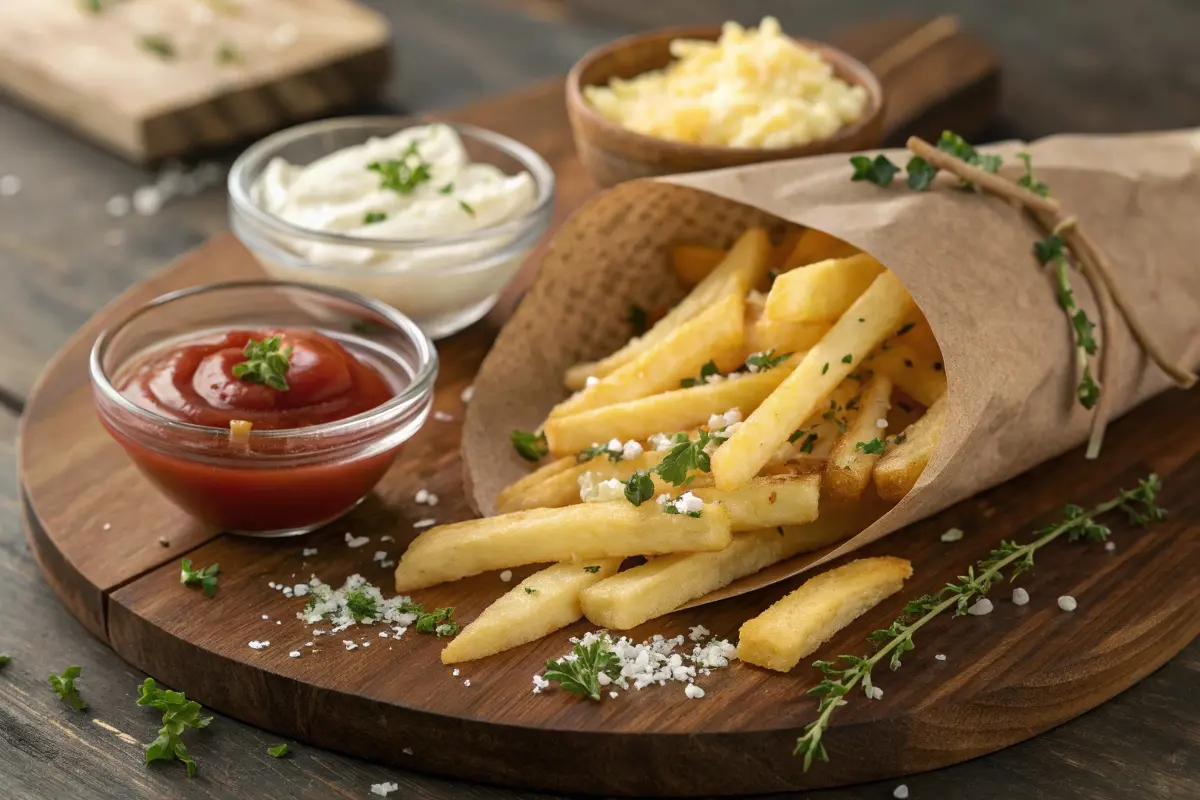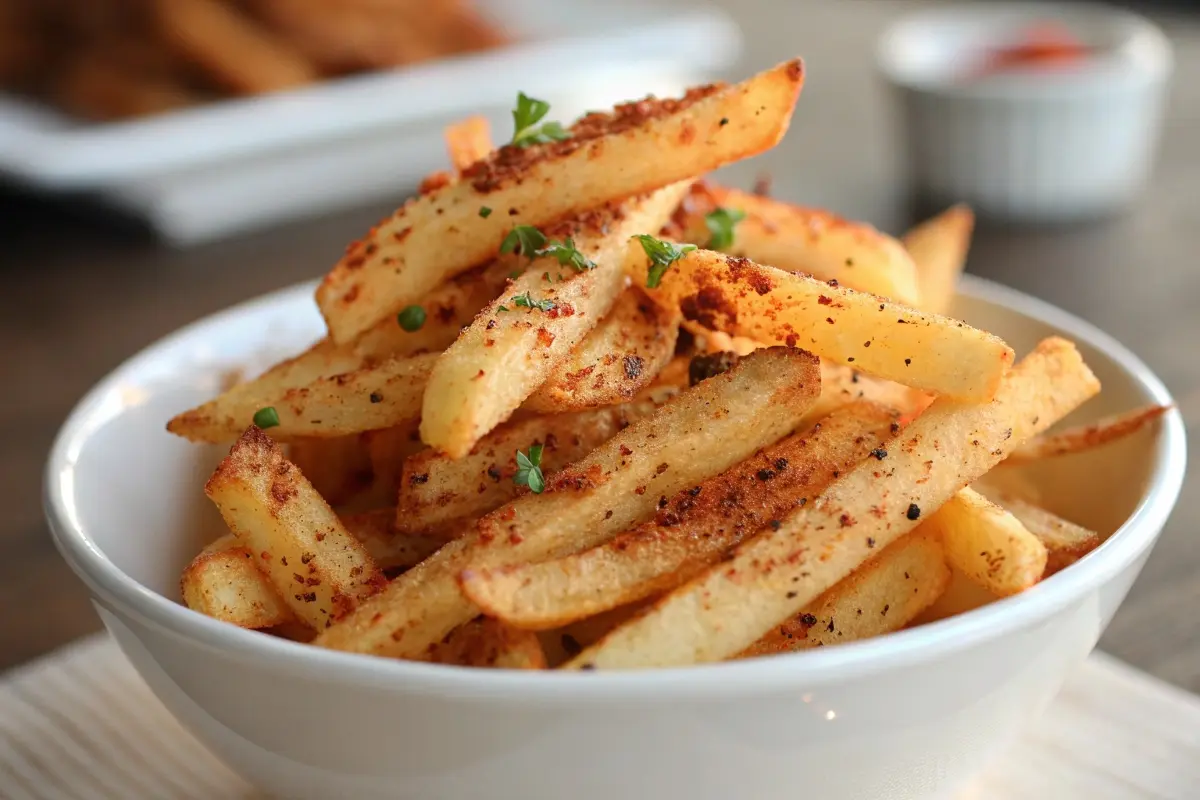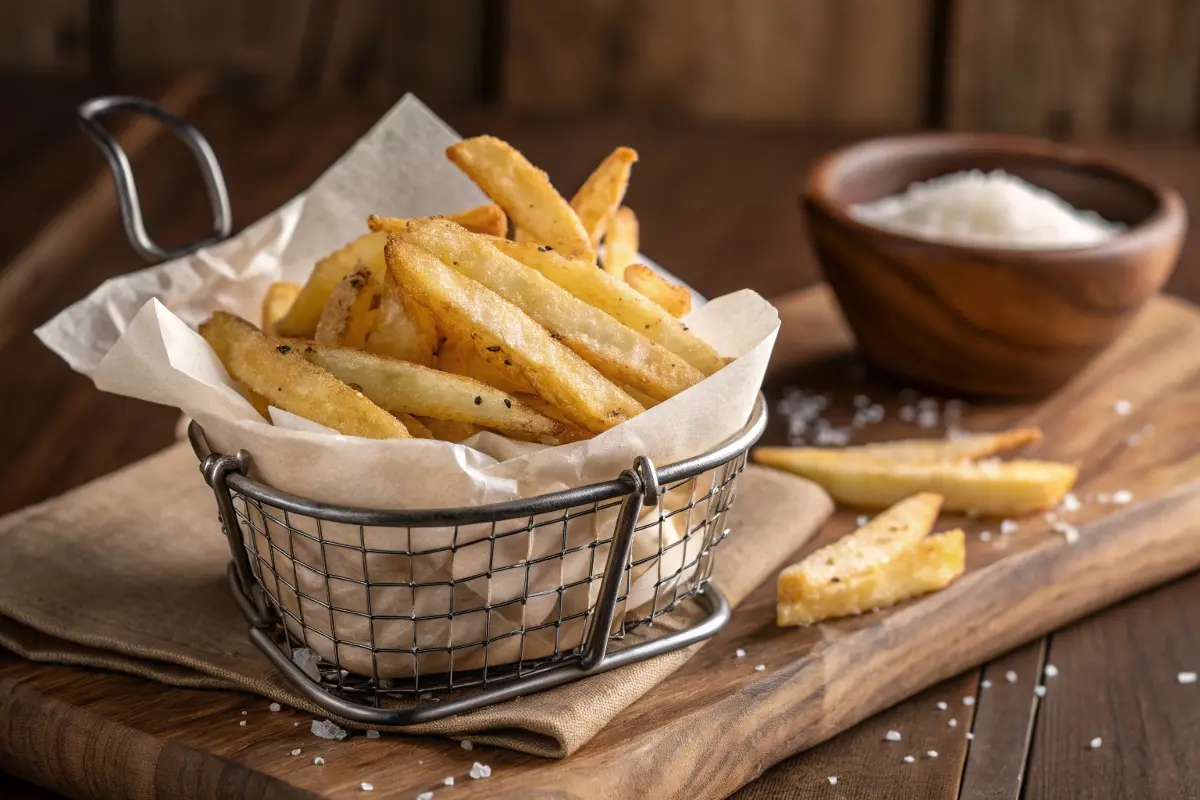Papas fritas: a dish loved across continents, but one that’s also surprisingly puzzling! Are they chips? Are they fries? 🤔 If you’ve ever asked yourself this question, you’re not alone. This article dives deep into the crispy, golden world of papas fritas to settle the debate once and for all. Along the way, we’ll explore their origins, cultural significance, preparation, and even how you can make the best batch at home!

Understanding Papas Fritas: A Culinary Introduction
What are Papas Fritas?
The term “papas fritas” translates directly to “fried potatoes” in Spanish. This simple translation, though, leaves room for interpretation—after all, both chips and fries are fried potatoes! Depending on where you’re from, papas fritas might mean thick-cut fries served with a burger or thin, crispy chips that crunch with every bite.
So, what’s the deal? Let’s start by unraveling the mystery of their origin.
Origin of the Term “Papas Fritas”
“Papas” means potatoes, and “fritas” means fried. The combination reflects the influence of Spain and Latin America, where potatoes have been a staple since the Spanish brought them from Peru in the 16th century. But the real twist lies in how different cultures have interpreted this term.
For example:
In Spain, papas fritas often refer to what Americans call French fries.
In many Latin American countries, they’re frequently synonymous with both fries and chips, depending on the context.
Chips vs. Fries: Are Papas Fritas Both?
While papas fritas may mean chips in one place and fries in another, let’s break down the distinctions between these two beloved snacks.
How Chips Are Made: The Papas Fritas Variation
Chips, also known as crisps in the UK, are ultra-thin slices of potato fried to a crisp. They are often seasoned with salt or flavored with spices like barbecue or sour cream and onion.
Key characteristics of chips:
- Thin and crispy.
- Usually served cold as a snack.
- Sold in bags for convenience.
How Chips Are Made: The Papas Fritas Variation
Fries are thick-cut potatoes, fried until golden and often sprinkled with salt. They’re served warm, usually as a side dish for meals like burgers or steak.
Key characteristics of fries:
- Thick and fluffy inside, with a crispy exterior.
- Served hot.
- Commonly paired with condiments like ketchup or mayo.
Key Flavor Differences in Papas Fritas: Chips vs. Fries
Ever noticed how chips offer a light, crunchy bite, while fries bring a more robust, savory satisfaction? The difference lies in their preparation. Chips are flash-fried for that snap, whereas fries undergo a double-frying process for extra crispness.
Are Papas Fritas the Same in Different Countries?
Yes and no. The interpretation of papas fritas varies based on cultural norms.
Papas Fritas in Latin America
In Latin America, papas fritas often mean French fries. From street vendors to upscale restaurants, they’re a staple side dish served with everything from grilled chicken to ceviche.
Papas Fritas in Spain
Spain takes a different route. Here, papas fritas are closer to homemade fries, often served with tapas or drenched in spicy brava sauce.
Papas Fritas in the United States
In the U.S., papas fritas are simply French fries, but if you’re bilingual, you might hear the term referring to both fries and chips, depending on who you’re talking to.
Common Confusions Around Papas Fritas
The phrase “papas fritas” has created its fair share of culinary confusion. Why? Because language and regional variations can make even the simplest dish sound more complex than it is!
Why the Name “Papas Fritas” Causes Misunderstandings
In Spanish-speaking countries, “papas fritas” directly translates to fried potatoes, but it doesn’t specify the form. This ambiguity is what causes debates. In some regions, like Mexico, papas fritas are often interpreted as fries. Meanwhile, in Argentina, you might hear people use the term interchangeably for chips or fries, depending on the context.
A similar confusion occurs in English. Americans think of fries as thick potato slices served with ketchup, while Brits refer to the same thing as “chips.” Confused yet? You’re not alone.
Regional Dialects and Culinary Terms
Food terminology isn’t just about ingredients—it’s about culture. Each country puts its own spin on what papas fritas mean.
Consider this:
In the Caribbean, you’ll find plantain-based papas fritas, which are more like chips made from bananas than potatoes.
It’s these regional twists that keep the debate alive.

How to Make Papas Fritas at Home: Chips or Fries
Craving papas fritas but prefer a homemade version over restaurant options? You’re in luck—we’ve got you covered! Preparing them at home is not only simple but also incredibly rewarding. Here’s everything you need to get started.
Ingredients for Perfect Papas Fritas
To create the perfect papas fritas, gather the following:
| Ingredient | Quantity |
|---|---|
| Potatoes (Russet) | 4 large |
| Vegetable Oil | 4 cups |
| Salt | To taste |
| Optional Seasonings | Paprika, Garlic Powder, etc. |
Steps to Cook Papas Fritas: Chips and Fries Edition
Step 1: Prep Your Potatoes
Start by washing, peeling, and cutting your potatoes. For fries, slice them into sticks about ½-inch thick. If you prefer chips, cut the potatoes into thin slices—using a mandoline makes this step easier. Soaking the potato pieces in cold water for at least 30 minutes removes excess starch. This ensures your papas fritas turn out extra crispy! 🥔
Step 2: Heat the Oil
Next, heat the vegetable oil in a deep pan or fryer to 350°F (175°C). Maintaining the right temperature is key to achieving perfectly fried potatoes.
Step 3: Fry the Potatoes
For fries, fry the potato sticks in batches for 3–4 minutes. Once done, take them out and let them rest for a moment. Fry them a second time for another 2–3 minutes until they’re golden and crispy. Chips, on the other hand, need just one fry—cook the thin slices until they’re light golden and crisp.
Step 4: Season and Serve
Immediately after frying, sprinkle the potatoes with salt or your choice of spices. Fries are best served hot, while chips should cool down for the ultimate crunch.
Popular Dishes Featuring Papas Fritas
Papas fritas aren’t just a standalone snack—they’re a key ingredient in countless dishes. Let’s take a look at how they’re used in different cuisines.
Classic Pairings: Burgers and Papas Fritas
Think of the iconic burger meal. Without a side of golden fries, it just feels incomplete, doesn’t it? Papas fritas add the perfect crunch and saltiness to balance out a juicy burger.
Innovative Recipes Incorporating Papas Fritas
Why stop at plain fries or chips? Here are some creative ways to use papas fritas:
- Loaded Fries: Topped with cheese, bacon, sour cream, and chives.
- Nacho Chips: Thin papas fritas smothered in melted cheese, jalapeños, and salsa.
- Papas Bravas: A Spanish favorite featuring fried potato chunks with spicy tomato sauce and aioli.
Healthier Options for Papas Fritas: Chips and Fries Alternatives
Sure, papas fritas are delicious, but are they healthy? Let’s examine the nutritional side of this irresistible snack.
Nutritional Differences: Chips vs. Fries
| Nutrient | Chips (1 oz) | Fries (1 cup) |
|---|---|---|
| Calories | 152 | 222 |
| Total Fat | 10g | 11g |
| Carbohydrates | 15g | 26g |
| Protein | 2g | 3g |
As you can see, both chips and fries are calorie-dense, making portion control key.
Are Papas Fritas Healthy?
The truth? Not really. Both forms are fried in oil, which adds fat and calories. However, you can make healthier versions by:
- Baking instead of frying.
- Using sweet potatoes for extra nutrients.
- Seasoning with herbs instead of salt.
Ways to Make Papas Fritas Healthier
Want to indulge guilt-free? Try these tips:
- Use an air fryer to cut down on oil.
- Serve fries with Greek yogurt dips instead of mayo.
- Pair chips with fresh salsa for a low-calorie snack.
Fun Facts About Papas Fritas: Chips and Fries Trivia
Let’s lighten things up with some trivia!
The Largest Papas Fritas Plate in History
Did you know the world record for the largest serving of fries was set in 2014 in the Netherlands? The plate weighed a whopping 4,890 pounds! 😲
Papas Fritas in Pop Culture
From appearing in hit songs to being a common trope in movies, papas fritas have cemented their place in pop culture. Ever seen a rom-com where the characters bond over fries? That’s how iconic they are.

FAQs: Are Papas Fritas Chips or Fries?
Are Papas Fritas French Fries?
Not always! While papas fritas often refer to fries, they can also mean chips, depending on the region.
Why Do Some People Call Them Chips?
It’s all about cultural differences. In the UK, fries are called chips, and chips are called crisps. It’s enough to make your head spin!
What’s the Best Oil for Frying Papas Fritas?
Neutral oils like vegetable, canola, or peanut oil work best. They have high smoke points, ensuring your papas fritas cook evenly.
Can I Make Papas Fritas Without Frying?
Absolutely! You can bake or air fry them for a healthier twist.
What’s the Origin of French Fries?
Despite the name, fries likely originated in Belgium, not France. The term “French fries” became popular in the U.S. during World War I.
Are Sweet Potato Fries Considered Papas Fritas?
Technically, no. “Papas” refers to potatoes, but sweet potato fries are a delicious alternative!
What Do Cubans Call French Fries?
Cubans also call French fries “papas fritas.” The term is consistent across most Spanish-speaking countries, though the style and thickness of the fries might vary.
What Are Papas Fritas?
Papas fritas are simply fried potatoes, which can refer to either French fries or potato chips, depending on the region.
What Language Is Papas Fritas?
The term “papas fritas” is Spanish, and it literally translates to “fried potatoes.” It’s widely used across Spanish-speaking countries.
Celebrating the Versatility of Papas Fritas
Whether you call them chips or fries, papas fritas are a universal delight that transcends borders. From a simple side dish to a cultural icon, they hold a special place in hearts—and on plates—all around the world. So, next time someone asks, “Are papas fritas chips or fries?” you’ll have the perfect answer: they’re whatever you want them to be! 🌍🍟
